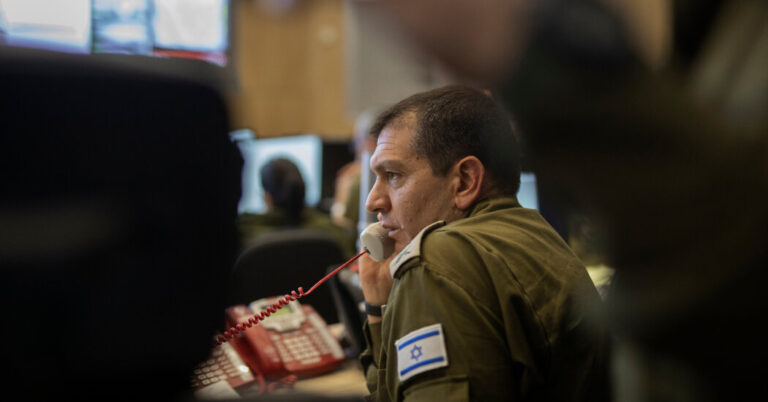Many Israelis were in a somber mood Monday as they prepared to usher in Passover, the Jewish holiday of freedom, saying they would mark the holiday rather than celebrate it, while more than 130 hostages remain at Gaza.
It is unclear how many hostages are believed to be alive, and with negotiations with the Hamas captors at an impasse, there is little chance of their imminent release.
The celebration should begin on Monday after sunset with the traditional Seder meal. Traditionally, it is a joyful gathering of family and friends who follow a ritual order of blessings around symbolic foods while recounting the biblical story of the slavery and suffering of the ancient Israelites in Egypt, as well as than their exodus and their liberation.
Israelis are still nervous after a firefight with Iran this month, the first time Tehran has directly attacked Israel from Iranian territory. And the country continues to mourn the nearly 1,200 people who Israeli authorities say were killed in the Hamas-led attack on southern Israel on October 7, which has so far sparked six months of deadly fighting in Gaza. More than 250 Israeli soldiers have been killed in Gaza since the Israeli ground invasion began in late October, according to the army. More than 34,000 Palestinians have been killed during the war, according to Gaza health authorities.
Daily tit-for-tat attacks on the northern border with Lebanon have transformed part of Israel into a restricted zone. Tens of thousands of residents in northern and southern Israel remain in temporary housing after being evacuated from their homes.
“We will celebrate Seder night for the children,” said Irit Feingold, 35, an educational instructor for preschoolers, who was attending a rally for the hostages in Jerusalem on Saturday evening and planned to spend Monday night with about 25 members of it. extended family.
“We will talk about leadership, freedom and staying free, and everyone can share how they feel,” she said.
Many families, like Ms. Feingold’s, have had emotional conversations about how to commemorate the holiday, with some saying they would rather not have a Seder at all.
“Every festival is a new step that shows how we are not whole,” Ms. Feingold said, adding that it was imperative to resist a return to normalcy and routine. Her husband, a reserve soldier, must return to Gaza after the holidays.
The organization representing most of the hostages’ families is calling on families to place an empty chair at their table with a portrait of a hostage or a yellow ribbon. Traditionally, Jews leave an empty chair at the Seder for Elijah, the biblical prophet revered as the harbinger of hope and redemption.
“All the symbolic things we do at the Seder will take on a much deeper, deeper meaning this year,” said Rachel Goldberg-Polin, whose son, Hersh Goldberg-Polin, 23, has dual Israeli and American citizenship. , was taken captive to Gaza after his arm was torn off during assault on roadside bomb shelter. He had taken refuge there after fleeing the Tribe of Nova music festival.
Mentioning the salt water that is part of the Seder ritual to represent the tears of the Israelites while in slavery in Egypt, Ms. Goldberg-Polin told reporters she would participate in a Seder with close friends and family , “and they made it very clear that if 15 minutes later we don’t make it and we have to cry, then we will cry.
Hundreds of survivors from Kibbutz Beeri, one of the border villages that were attack on October 7, planned to hold a community Seder in a Tel Aviv square that become a focal point for the campaign to free the hostages.
A quarter of the residents of another border village, Nir Oz, were killed or kidnapped. Avner Goren, son of the founders of the communal village, wrote a poem comparing the Israeli people to a fruit salad – some sour, some sweet – to celebrate the country’s multicultural mix in a version of the Haggadah produced by Nir Oz at the end from the 1990s.
Mr. Goren was killed on October 7. His wife, Maya Goren, was kidnapped and taken to Gaza and pronounced dead. Addressing the gathering in Jerusalem on Saturday evening, Rabbi Binyamin Lau said he planned to sit at the Seder table with his family, an empty chair with a photo of his friend Alex Dancyg, an expert of the Holocaust of Nir Oz who remains hostage, and a fruit salad.
Rabbi Lau, himself the son of a Holocaust survivor, said: “We are a people who tell a story at all times and in all conditions. »
Myra Noveck contributed to reporting from Jerusalem, and Gabby Sobelman from Rehovot, Israel.


